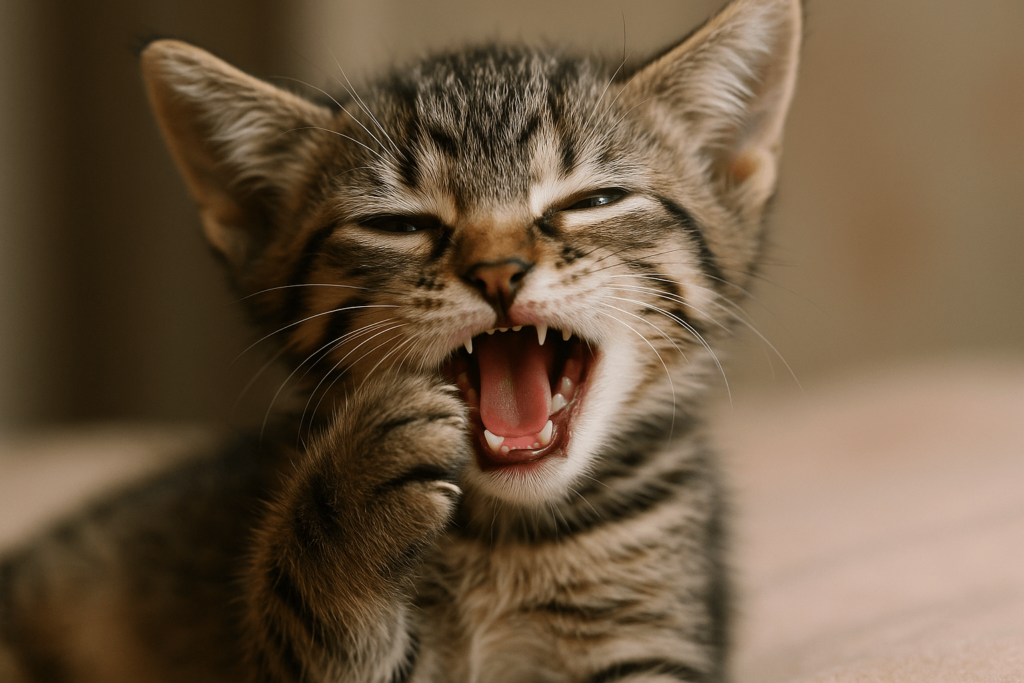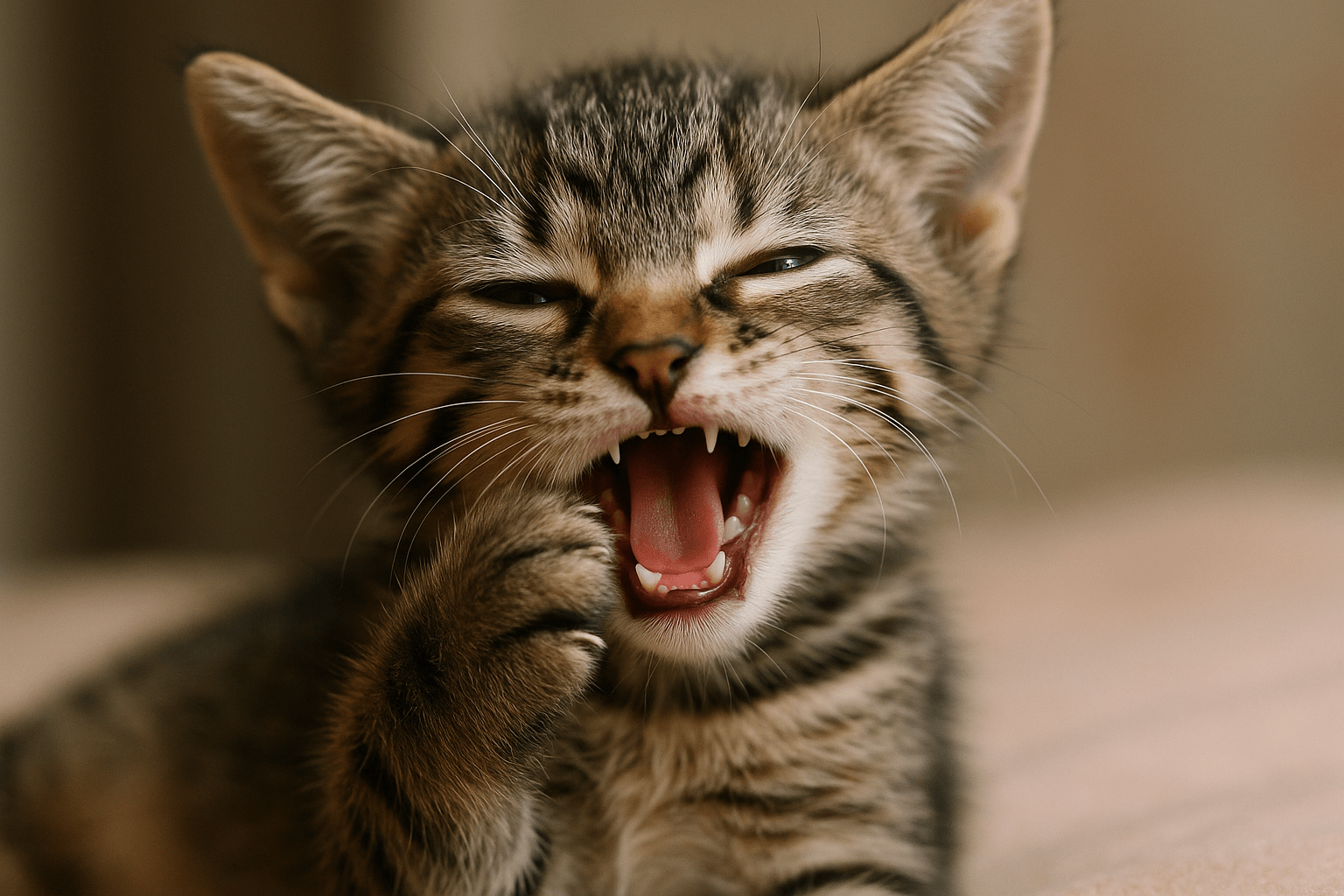Cat Teething Symptoms: What Every Cat Owner Should Know
Like human babies, kittens go through a teething phase as they grow and develop. This natural process involves the replacement of their baby teeth with permanent adult teeth, typically occurring between 3 and 6 months of age. During this time, you may notice changes in your kitten’s behavior, eating habits, or physical appearance—all signs of teething. Understanding these symptoms is essential for ensuring your kitten remains comfortable and healthy throughout this transitional period. In this blog post, we’ll explore everything you need to know about cat teething, from identifying symptoms to providing proper care and support.
Common Symptoms of Cat Teething
Teething can cause noticeable changes in your kitten’s behavior and physical condition. Recognizing these symptoms will help you determine whether your kitten is simply going through a normal developmental phase or experiencing something more serious.
Excessive Drooling:
As their new teeth emerge, kittens may drool more than usual due to irritation in their gums.Chewing on Objects:
Kittens often chew on toys, furniture, or even your fingers to relieve gum discomfort caused by teething.Loss of Appetite:
Some kittens may eat less during teething because chewing hard food becomes uncomfortable.Bad Breath:
The combination of loose baby teeth and emerging adult teeth can lead to temporary bad breath in kittens.Swollen or Bleeding Gums:
Redness, swelling, or minor bleeding around the gums is common as adult teeth push through.
By observing these symptoms, you can better understand what your kitten is experiencing and provide appropriate care during this critical stage of development.

How to Support Your Kitten During Teething
Helping your kitten navigate the teething process requires patience and proactive measures. Here are some practical ways to ensure their comfort and safety while they grow into their adult teeth.
Provide Safe Chew Toys:
Offer soft, durable chew toys designed for kittens to satisfy their urge to gnaw without damaging household items.Monitor Their Diet:
Switch to softer food temporarily if your kitten struggles to eat dry kibble. Wet food or softened kibble can make meals easier.Keep Hazardous Items Out of Reach:
Electrical cords, small objects, and toxic plants should be secured to prevent accidental ingestion while your kitten chews indiscriminately.Check for Loose Teeth:
Gently inspect your kitten’s mouth for loose baby teeth that may need assistance coming out to avoid complications.Maintain Oral Hygiene:
Use a kitten-safe toothbrush and toothpaste to clean their teeth regularly, promoting long-term dental health.
Taking these steps not only alleviates discomfort but also sets the foundation for good oral hygiene practices later in life.
Check this guide 👉Healthy Cat Teeth vs Unhealthy: Best 7 Expert Tips!
Check this guide 👉Understanding Cat Teeth Plaque: Best 7 Expert Tips!
Check this guide 👉How Should Cat Teeth Look? Best 7 Expert Tips!
Signs Your Kitten Is Teething | Ways to Help Your Kitten |
|---|---|
Excessive drooling | Provide safe chew toys |
Chewing on objects | Monitor and adjust their diet |
Loss of appetite | Remove hazardous items from the home |
Bad breath | Check for loose teeth |
Swollen or bleeding gums | Maintain oral hygiene |
Potential Complications During Teething
While teething is a natural process, complications can arise if issues aren’t addressed promptly. Being aware of potential problems allows you to intervene early and protect your kitten’s health.
Retained Baby Teeth:
Sometimes, baby teeth don’t fall out as expected, leading to overcrowding and misalignment of adult teeth.Infection Risk:
Open wounds in the gums from teething can become infected if bacteria enter the area.Difficulty Eating Solid Food:
Persistent refusal to eat solid food could indicate pain or other underlying issues requiring veterinary attention.Broken Adult Teeth:
Emerging adult teeth may crack or break if subjected to excessive pressure during chewing.Behavioral Changes:
Unusual aggression or lethargy might signal discomfort beyond typical teething symptoms.
Addressing these complications promptly ensures your kitten transitions smoothly into adulthood with strong, healthy teeth.
When to Consult a Veterinarian About Teething
While most teething symptoms are harmless, certain situations warrant professional advice. Knowing when to seek veterinary care ensures your kitten receives timely treatment for any concerns.
Persistent Bleeding:
If your kitten’s gums bleed excessively or don’t stop after a few minutes, consult your vet immediately.Signs of Pain:
Whining, pawing at the mouth, or avoiding touch near the face indicates possible pain that needs evaluation.Fever or Lethargy:
These symptoms could suggest an infection or another serious issue related to teething.Refusal to Eat Completely:
A total loss of appetite lasting more than 24 hours requires urgent medical attention.Abnormal Tooth Growth:
Misaligned or deformed adult teeth may need corrective procedures to prevent future dental problems.
Regular check-ups with your veterinarian can help catch and address these issues before they escalate.
Tips for Choosing Safe Chew Toys
Selecting the right chew toys is crucial for keeping your teething kitten entertained and safe. Consider these tips to find the perfect options for your feline friend.
Opt for Soft Materials:
Choose toys made from soft rubber or fabric to prevent damage to delicate gums.Avoid Small Parts:
Toys with detachable pieces pose a choking hazard and should be avoided entirely.Look for Edible Options:
Dental chews designed for kittens can double as treats while soothing sore gums.Rotate Toys Regularly:
Keeping a variety of toys available prevents boredom and reduces destructive chewing behaviors.Supervise Playtime:
Always monitor your kitten during play to ensure they’re using toys safely.
Thoughtfully chosen chew toys not only entertain but also promote healthy dental development.
How to Encourage Healthy Eating Habits
Maintaining proper nutrition during teething is vital for your kitten’s overall health. Use these strategies to encourage healthy eating habits despite potential discomfort.
Offer Variety in Texture:
Mix wet food with softened kibble to create appealing textures that are gentle on gums.Warm Up Food Slightly:
Warming canned food enhances its aroma and makes it more enticing for picky eaters.Serve Smaller Portions More Frequently:
Breaking meals into smaller portions throughout the day minimizes strain on sensitive gums.Introduce Fresh Water Daily:
Ensure fresh water is always available to keep your kitten hydrated and aid digestion.Gradually Transition Back to Dry Food:
Once teething subsides, slowly reintroduce dry kibble to rebuild chewing strength.
With creativity and consistency, you can ensure your kitten stays nourished during this tricky phase.
Long-Term Benefits of Proper Teething Care
Investing time and effort into your kitten’s teething care pays off in numerous ways, benefiting both their immediate well-being and future health.
Stronger Adult Teeth:
Supporting healthy teething promotes the growth of robust, properly aligned adult teeth.Reduced Risk of Dental Disease:
Early oral hygiene habits lower the likelihood of plaque buildup and gum disease later in life.Improved Behavior Patterns:
Redirecting destructive chewing toward safe outlets fosters better behavior as your kitten matures.Enhanced Bonding Opportunities:
Engaging with your kitten during teething strengthens your relationship and builds trust.Peace of Mind for Owners:
Addressing teething symptoms proactively reduces stress and ensures a smoother transition for everyone involved.
By prioritizing teething care, you set the stage for a happy, healthy, and harmonious life with your beloved pet.
Frequently Asked Questions About Cat Teething Symptoms
At what age do kittens start teething?
Kittens typically begin teething around 3 months old, with the process lasting until they’re about 6 months old.
Why does my kitten chew on everything?
Chewing helps relieve gum soreness caused by emerging adult teeth, making it a normal part of teething.
Should I pull out loose baby teeth?
It’s best to let baby teeth fall out naturally; pulling them prematurely can cause injury or infection.
Can teething cause diarrhea in kittens?
While mild digestive upset might occur, persistent diarrhea isn’t directly linked to teething and should be evaluated by a vet.
How can I tell if my kitten has an infection?
Signs include swollen gums, pus discharge, foul odor, fever, or behavioral changes—contact your vet if you suspect an infection.
Nurturing Your Kitten Through Teething
Teething is a natural yet challenging milestone for kittens and their owners alike. By understanding the symptoms, providing supportive care, and staying vigilant for potential complications, you can guide your kitten through this transformative stage with ease. Remember, patience and attentiveness are key—your efforts now will pave the way for a lifetime of strong, healthy teeth and joyful companionship. With love, care, and the right tools, you’ll help your furry friend thrive during this important phase of growth.
Canned Pumpkin for Cat Diarrhea: Best 7 Expert Tips! Natural remedy to firm stools, soothe upset bellies, and support gut health safely.
Can a Cat Give You Scabies? Best 7 Expert Tips! Discover the truth about feline mites, human skin risks, and how to protect yourself—without panic.
Cat Flea vs Human Flea: Best 7 Expert Tips! Discover the truth about bites, species, and how to eliminate infestations for good.
Weird Cat Behaviors: Best 7 Expert Tips! Discover why cats do strange things—and how to understand, not punish, their instincts for a happier home.





